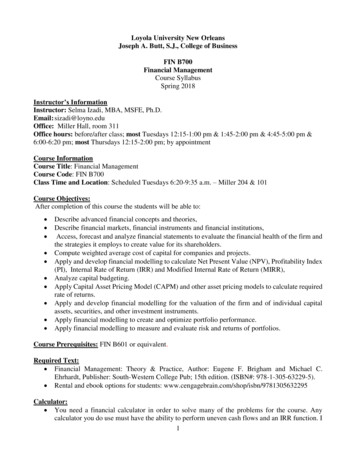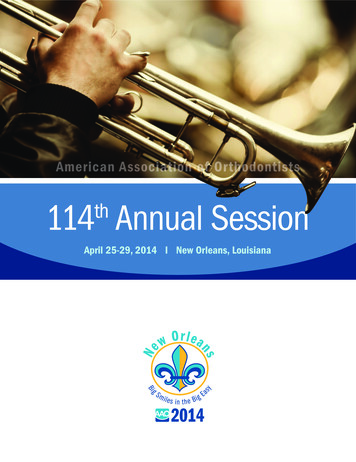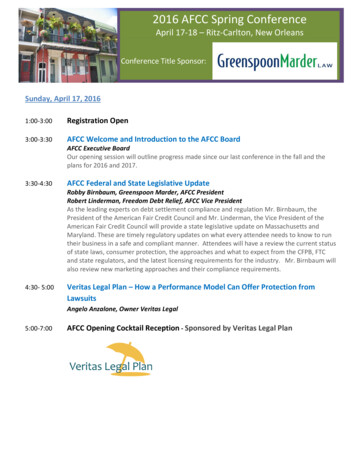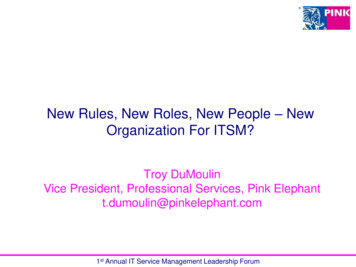
Transcription
Loyola University New OrleansJoseph A. Butt, S.J., College of BusinessFIN B700Financial ManagementCourse SyllabusSpring 2018Instructor’s InformationInstructor: Selma Izadi, MBA, MSFE, Ph.D.Email: sizadi@loyno.eduOffice: Miller Hall, room 311Office hours: before/after class; most Tuesdays 12:15-1:00 pm & 1:45-2:00 pm & 4:45-5:00 pm &6:00-6:20 pm; most Thursdays 12:15-2:00 pm; by appointmentCourse InformationCourse Title: Financial ManagementCourse Code: FIN B700Class Time and Location: Scheduled Tuesdays 6:20-9:35 a.m. – Miller 204 & 101Course Objectives:After completion of this course the students will be able to: Describe advanced financial concepts and theories,Describe financial markets, financial instruments and financial institutions,Access, forecast and analyze financial statements to evaluate the financial health of the firm andthe strategies it employs to create value for its shareholders.Compute weighted average cost of capital for companies and projects.Apply and develop financial modelling to calculate Net Present Value (NPV), Profitability Index(PI), Internal Rate of Return (IRR) and Modified Internal Rate of Return (MIRR),Analyze capital budgeting.Apply Capital Asset Pricing Model (CAPM) and other asset pricing models to calculate requiredrate of returns.Apply and develop financial modelling for the valuation of the firm and of individual capitalassets, securities, and other investment instruments.Apply financial modelling to create and optimize portfolio performance.Apply financial modelling to measure and evaluate risk and returns of portfolios.Course Prerequisites: FIN B601 or equivalent.Required Text: Financial Management: Theory & Practice, Author: Eugene F. Brigham and Michael C.Ehrhardt, Publisher: South-Western College Pub; 15th edition. (ISBN#: 978-1-305-63229-5). Rental and ebook options for students: ator: You need a financial calculator in order to solve many of the problems for the course. Anycalculator you do use must have the ability to perform uneven cash flows and an IRR function. I1
recommend Texas Instruments BAII Plus. Make sure that you bring your calculator to class andfor each exam. You are not allowed to share calculators during exams.Lecture Notes: I will post the lecture notes on Blackboard. You are expected to bring them to class.Problem Sets: There will be regular problem sets for this class. Problem sets are to be collected at the beginningof the due date. Should he or she for any reasons turn in the homework assignment after the duedates, his or her scores will be discounted 20%.Excel Models, Case Studies: During the semester you will have financial projects which you will need to apply excel to solvethem. More information will be provided on Blackboard.Group Project:Each student will be part of a 4 person team that is responsible for a public company. Each team willwrite a report and make a “stock pitch” presentation to convince the class what investment they wouldadvise for this particular company (and why). More details about stock pitch will be posted onBlackboardExams: There will be three exams during the semester, with the specific dates and content as set in thecourse schedule. They are designed to provide feedback concerning your understanding ofspecific topics. The exams will consist of multiple choice questions, numerical problems, and insome cases short essays. The tests will contain both conceptual questions and quantitativeproblems.Grade Breakdown:Problem sets5%Case studies10%Excel Models5%Group Project20%Exam120%Exam 220%Final Exam (non-Comprehensive)20%Total100%University Grade Scale: A (93-100), A- (90-92), B (87-89), B (83-86), B- (80-82), C (77- 79), C(73-76), C- (70-72), D (66-69), D (60-65), F (below 60).Attendance:You are allowed 2 absences in this class. Upon your 3 absence, you will incur the followingconsequence(s): 2 points will be deducted from the final grade. Optional extra credit assignments might be given during the semester. The students having morethan 2 absences will not be eligible to receive extra credit.2
Please try to be in class on time. Please do not leave the class during the session and if you need to leaveearlier, please inform me before the class starts. Courteous behavior and responses are expected duringthe class.Communication:Blackboard will be used for all homework assignments, grades and announcements. It is yourresponsibility to follow all announcements, course documents, homework assignments and deadlines.Please log-in to Blackboard frequently.I check email regularly every day and respond very well to emails as long as you follow the followinginstructions: All e-mails must originate from your Loyola e-mail account and use the following title format: FINB700- Name-Subject (e.g., FIN 700 - John Smith-question on homework # 3). As a general rule, if I haven't replied to your email in two days (including weekends), it's usually thecase that the email never gets to me. In that case please send the email again.Make-Up Exam Procedure:Unless a student has an official university-approved reason for missing a regularly scheduledexamination and/or has made prior arrangements with me directly, there is no makeup exam scheduled.Students should email me before the test is scheduled concerning legitimate exam-related issues, withunanticipated emergencies as the obvious exception.Disability Services and Accommodations Statement:Students needing academic accommodations for a disability must first be registered with the Office ofDisability Services (ODS) to verify the disability and to establish eligibility for accommodations. Ifyou perceive disability-related barriers in a course, please let the ODS know immediately. ODSwelcomes your feedback that will assist in improving the usability and experience for all students.Loyola is committed to offering classes that are inclusive in their design. ODS contact information isas follows:Marquette Hall, Room 112504-865-2990 (front office)ods@loyno.eduEmergency Statement:At times, ordinary university operations are interrupted as a result of tropical storms, hurricanes, orother emergencies that require evacuation or suspension of on-campus activities. To prepare for suchemergencies, all students will do the following during the first week of classes:1. Practice signing on for each course through Blackboard.2. Provide regular and alternative e-mail address and phone contact information to each instructor. In the event of an interruption to our course due to the result of an emergency requiring anevacuation or suspension of campus activities, students will:3. Pack textbooks, assignments, syllabi and any other needed materials for each course ad bring duringan evacuation/suspension.4. Keep up with course work during the evacuation/suspension as specified on course syllabi and online Blackboard courses.3
5. Complete any reading and/or writing assignments given by professors before emergency began.Assuming a power source is available.6. Log on to university Web site within 48 hours of an evacuation/suspension.7. Monitor the main university site (www.loyno.edu) for general information.8. Log on to each course through Blackboard or e-mail within 48 hours of an evacuation/suspension toreceive further information regarding contacting course instructors for assignments, etc.9. Complete Blackboard and/or other online assignments posted by professors (students are required toturn in assignments on time during the evacuation/suspension period and once the university campushas reopened.)10. Contact professors during an evacuation/suspension (or as soon as classes resume on campus) toexplain any emergency circumstances that may have prevented them from completing expected work.Further information about student responsibilities in emergencies is available on the Academic Affairsweb rgency-responsibilities4
Tentative Course Outline:The readings assigned below are designed to complement the AprilTopicMBA Break Week- No ClassSyllabus and Class OrientationChapter 1: An overview of Financial Management and the FinancialEnvironmentChapter 2: Financial Statement, Cash Flow and TaxesExcel WorkshopChapter 3: Analysis of Financial Statements Case Studies(4)Excel WorkshopChapter 5: Bond Valuation and Interest Rates Case Studies(3)Excel WorkshopChapter 6: Risk and Return Case Studies(2)Excel WorkshopMardi Gras Holidays- No ClassChapter 25: Portfolio Theory and Asset Pricing Models Case Studies–papers (3)Excel WorkshopExam1- (CH 1,2,3,5,6, 25)Chapter 7: Stock ValuationExcel WorkshopExam Review- Chapter 7: Stock ValuationChapter 9: The Cost of Capital Mini case Ch9Excel WorkshopMBA Break Week- No ClassChapter 10: The Basics of Capital Budgeting Mini case Ch10Chapter 13: Corporate Governance Mini case Ch13Excel WorkshopEaster Holidays- No ClassReview Case Studies(2)Chapter 14: Distributions to Shareholders Mini case Ch14Chapter 15: Capital Structure Decisions Mini case Ch15Excel WorkshopExam 2- (CH 7, 9,10,13)Chapter 18: Public and Private Financing: Initial Public Offerings,seasonal offering and Investment Banks Mini case Ch18Chapter 20: Hybrid Financing: Preferred Stock, Warrants, andConvertibles Mini case Ch20Excel Workshop5
17-April24-AprilMay-1Stock Pitch Projects Case Studies(2)Stock Pitch Projects Case Studies(2)Projects FeedbackFinal Exam (CH 14,15,18,20)Note: The instructor reserves the right to make changes to the requirements and schedule.6
Loyola University New Orleans Joseph A. Butt, S.J., College of Business FIN B700 Financial Management Course Syllabus Spring 2018 Instructor’s Information Instructor: Selma Izadi, MBA, MSFE, Ph.D. Email: sizadi@loyno.edu Office: Miller Hall, room 311 Office hours: before/after class; most Tuesdays











